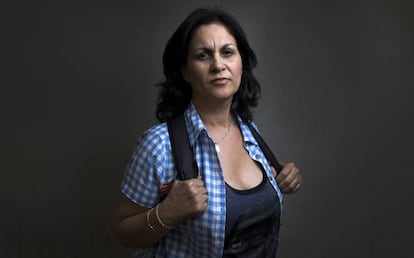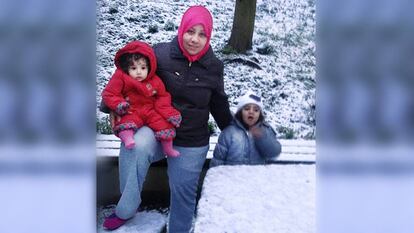The woman who will turn off her phone when the war in Syria is over
Souad Benkaddour, a Moroccan living in Madrid, has helped hundreds of Syrians as they pass through Spain to the promised land of northern Europe

The first Syrian refugee that Souad Benkaddour, 53, ever helped was a pregnant woman with three children who arrived at Madrid’s Méndez Álvaro bus station in September 2015. Souad explains that she was actually on her way to Segovia with her family when a neighbor called to ask if she would translate for the woman. “I told my husband and he did a U-turn,” says Souad, who is Moroccan by birth.
Souad’s first language is Arabic, but she was thrown by the woman’s Syrian accent, and she found herself switching to classical Arabic. She could not have imagined at the time that she would go on to help more than 500 arrivals from Syria, Palestine, Iraq and Bangladesh, or that her telephone would become a helpline for so many refugees.
Souad and her neighbors made it possible for that Syrian woman, Fayrouz, and her three children, to continue on to Germany. They had crossed the Moroccan border into the Spanish enclave of Melilla, along the northern coast of Africa, by hiding on the underside of trucks. After meeting Souad, they were able to sit on a bus to Paris.
Souad Benkaddour has helped more than 500 people arriving from Syria, Palestine, Iraq and Bangladesh to continue their journey to northern Europe
Souad and her neighbors subsequently discovered that there were dozens of refugees sleeping in the park across from the Méndez Álvaro bus station, and they decided to work together to get them off the streets.
It was around this time that the refugee crisis in Europe peaked. Hundreds of thousands of Syrians were knocking on Europe’s doors to escape the war. Many came over land across Tunisia, Algeria and Morocco, to enter Europe through Melilla, but for most of them Spain has been a stepping-stone to elsewhere – countries that are perceived to offer more support and opportunity. According to Eurostat, just 2,975 Syrians applied for asylum in Spain in 2016 compared to 300,000 for the whole of the European Union.
Hundreds of NGOs raised money to help them on their way, but thousands of ordinary people like Souad helped too. Together with her neighbors, she set up an ingenious system of favors that is still in operation. The pregnant Fayrouz needed someone to meet her in Paris, so Souad asked friends and family to lend a hand. One of them met Fayrouz at the station and gave her a place to stay. Before she moved on, Souad told Fayrouz to give her phone number to anyone else she knew who needed help. “I began to get 20 to 30 calls a day,” says Souad.
Souad’s own story has some similarities with those of the people she assists. In the city of Al Hoceima where she was born, Souad says she was not free to behave as she wished. “I wanted to experience success and failure without barriers,” she explains.
She realized that she had a talent for helping others, and offered her support to pregnant Moroccan girls dealing with intolerant families while she dreamed of migrating to a more liberal country where women were free to choose how to live their own lives. When she arrived in Spain at the age of 38, she took a long, deep breath. “I felt I could be myself,” she says. “I felt free.”

According to Souad, the feeling she had of finally reaching her destination is exactly the same feeling experienced by the Kubani family when they got to Saarbrüken in Germany. When they left Syria, there were 14 of them but they were abducted twice en route and by the time they entered Europe, only the father Ahmed and one daughter were left.
Now, safe at last, they send Souad the occasional WhatsApp to tell her how they are getting on. She also receives photos of the Nordin family from Saarbrüken, whose children have been able to play in snow for the first time. Like the Kubanis, they are grateful.
Although Syrians and Moroccans are culturally alike in some respects, Souad had never met any Syrians before 2015. “Now I can tell which town each of them comes from,” she explains.
There is a catch, though, to being helped by Souad and her neighbors: a refugee who has received assistance must, in turn, assist someone else. “I explain to them that when they arrive at their destination, someone will be waiting to meet them and that in the future they will be expected to meet someone themselves,” says Souad.
Souad’s network extends as far as the Red Cross, which calls her when a busload of refugees leaves Granada for Madrid. The ASLA bus company also uses her when a refugee arrives to buy a ticket and needs a translator.
The agreement signed by the EU and Turkey in March 2016 has drastically reduced the number of refugees able to enter Europe
Souad’s dedication to the plight of the refugees has at times disrupted her family life. Last summer, her husband told her, “When you are at the bus station, you can’t be at home. But when you’re at home, all you are thinking about are the refugees.”
At the time, Souad was spending every day of the week at the bus station and her phone rang 24/7. Sometimes she would switch it off only to find dozens of missed calls when she turned it on again. “I couldn’t return all the calls,” she says. “There came a point when I had to learn to balance what I was doing with the needs of my family.”
When the EU signed an agreement with Turkey in March 2016, the calls grew less frequent due to the drastic drop in the numbers of refugees able to enter Europe. In a few months, hundreds of daily arrivals had become 50 at the Méndez Álvaro bus station. Now, Souad no longer goes to the station but she is still receiving calls, translating, organizing accommodation and helping in any way she can. “I don’t regret giving my time or my life to this cause,” she says.
Souad is unsure whether to define herself as an activist – she simply feels fulfilled when she helps others. She acts from instinct and independently. And although she has helped hundreds of people, she sometimes wonders if she could not have helped more. These niggling doubts are, however, silenced by another message: “Salam Alaikum, Souad. We need your help.” And she responds automatically as if it were the most natural thing in the world. “I’ll turn my phone off when the war in Syria is over,” she says.
This story is part of a project called The New Arrivals, funded by the European Journalism Centre with support from the Bill & Melinda Gates foundation, in which EL PAÍS is a participating member together with The Guardian, Der Spiegel and Le Monde.
English version by Heather Galloway.